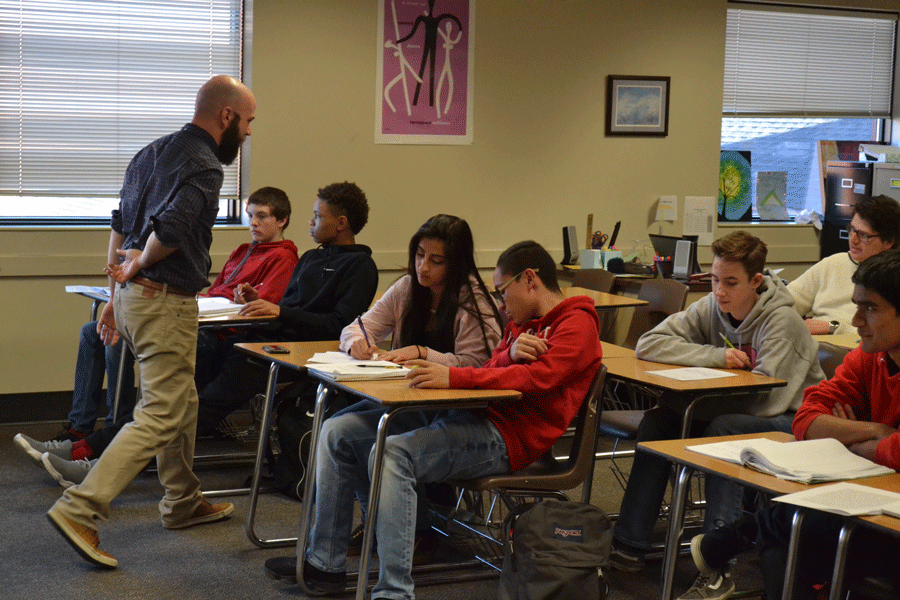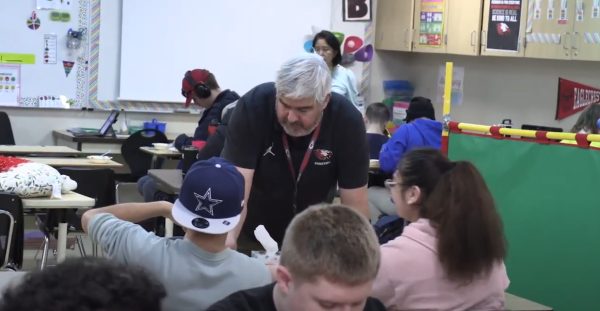Everything is Yoni Fine
English teacher Jonathan Fine has been dedicated to teaching for eleven years and in those years, has impacted students and helped them learn how to think. To Fine, teaching isn’t just a job, it’s a way for him to make a difference.
“I get to think and help other people think. Hopefully, I can make an impact on people and the world,” Fine said.
Everyone has that one teacher that has significantly impacted them. Fine isn’t different. Mr. Zambernardi (his students called him Zambo), Fine’s high school Humanities teacher, pushed his class and pushed his class to think more harder on challenging, controversial topics. Zambo even had one of those ‘THINK’ posters. Fine remembers this poster and how he would stare at it throughout class and realize that thinking is all anyone really has to do.
Sophomore Winta Kibrom, who had Fine as a freshman, confirms that Zambo’s lessons have been carried on through into Fine’s own classes.
“Mr. Fine taught me how to think with different perspectives. We simplify things by putting people into categories or giving them different labels when actually people are more complicated and in depth than that.” Kibrom said.
After describing how much Zambo made an impact on him, Fine admits that he doesn’t believe Zambo knew what kind of difference he made on Fine.
“One of the hardest things about teaching is that you just have to have faith that you’re having some sort of positive impact on people and helping them down the line when you don’t see the results.” Fine said.
There aren’t bad teachers, there is just teacher burnout as Fine describes. As many know, this is where teachers get cynical and begin to complain about things. Often times, one of the frustrations that cause it is the belief of not impacting anyone, something all teachers try to accomplish.
“I feel that in any job you need to focus on the positive things and then you’ll realize how great it is. If I focused on the negative part of my job, I would’ve been done long ago,” he said. “There is so much that’s special about interacting with people everyday and thinking with them. If you can focus on that, then you’ll realize how special teaching is. I’m really grateful for it.”
Those negative aspects of the job consist of sacrificing time with his family. Being able to go to more school plays and sporting events for EHS are just some things Fine finds impossible to do with his two children, the five year old Isaac and the two year old Rocco.
In the time Fine isn’t putting together lesson plans and grading assignments, he is playing with his kids. Whether it’s playing baseball in the backyard or going to museums, the time he spends with his kids is sacred.
“My kids are only going to be that small for a short amount of time, so I try to do as much as I can with them.” Fine said.
When Fine was going into ninth grade, a huge transition from middle school to high school, he also had to switch from a private jewish school to a public one. He was already a shy and quiet student, so switching to a school without knowing anyone was difficult.
Despite falling into a group of friends, Fine describes his ninth grade year as rough. The first year of high school can provide struggles for many students. Finding their way through the crowded halls, the endless classes full of teachers whose name you couldn’t remember, and the students with those judging eyes. It’s hard to feel settled when you are on the bottom of the foodchain. For some students, teachers like Fine are a big help when it comes to figuring out high school.
“This is part of why I like teaching ninth grade because it’s so rough and there’s a lot to figure out,” Fine said.
Winta Kibrom agrees that Fine is successful in making students feel settled. Kibrom can be described as being shy and pretty quiet by friends just like Fine as a student.
“Mr. Fine definitely made me feel settled my freshman year. His classroom environment was very comfortable and open, so I wasn’t really scared to participate in class.” Kibrom said.
The other part of why he loves teaching is due to tutoring kids with learning disabilities after college, Fine realized that not only is he good at teaching, but he got something out of it and so did his students. The opportunity to make a connection and learn new things about people.
“There are great people out there. I think the more connections you make with people, the richer your life becomes,” Fine said.
The connections made in high school can last further down the road. Today, he still is friends with people that he meet in high school. Special bonds like that can really change you.
“You could enrich your understanding of the world, of yourself, and just meet new people that you may have connections with for your whole life,” Fine said. “Not everyone has to be a social butterfly, but still I think you’ll get the most out of it everyday if you actually meet people.”
For a teacher who started out as a shy student, helping students make connections in high school is understandably very important to him.
“We go around all the time, not accessing the connections that are possible with the people around us. It’s kind of a waste,” he said. “There’s great people around, people aren’t always great, but there’s great things about everyone in the school. We kinda close ourselves off to them.”
Amanda Ford was a journalist for the Eagle Quill in her sophomore year.







